Opportunity Details
Please join us for a Learn from Home Volunteer Orientation and Training!After you register we will send you an invitation and link to join us for a Zoom format meeting.
This fun and informational orientation is the first step in joining us as an official Reserve Volunteer. Learn about The Reserve's history, philosophy and mission, as well as skills for working with the public.
CERTIFIED RESERVE VOLUNTEER PROGRAM:
This training is the first step in becoming a Certified Reserve Volunteer. Certified Reserve Volunteers are specially trained volunteers that lead and co-lead Reserve programs.
Ages: Adult, 18 and older
Thank you for expressing interest in volunteering for The Reserve at Rancho Mission Viejo.
Available Shifts
| Shift Name | Signup Max | Start | End |
|---|---|---|---|
| General | no limit | n/a | n/a |

Opportunity Details
Come and take part in research at your local Tiny Forest!About this event
Earthwatch invites you to attend your Tiny Forest’s first monitoring day this summer.
With the help of you - our citizen scientists - we are monitoring five key benefits across each of our 17 Tiny Forests. Specifically looking at how the forests change over time and how they differ per location.
We are researching:
• Thermal comfort: the cooling benefits of the trees
• Flood management: the forest’s ability to store water
• Biodiversity: focussing on butterflies, pollinators and soil-dwelling organisms
• Carbon capture: how much carbon a Tiny Forest sequesters and stores
• Wellbeing: conducting social surveys with volunteers
So please come along for an hour, to collect data on the Tiny Forest and support our ongoing research.
All events will be managed in line with current Government COVID-19 guidelines to create a safe day for all. We are therefore running hour-long volunteering slots, for you to choose from.
Important information:
- Please indicate how many people are in your group (children under 16 do not require a ticket)
- Please bring a face covering
- Hand sanitiser will be provided
- Please respect social distancing guidelines
Available Shifts
| Shift Name | Signup Max | Start | End |
|---|---|---|---|
| Shift 1 | 5 | n/a | n/a |
| Shift 2 | 5 | n/a | n/a |
| Shift 3 | 5 | n/a | n/a |
| Shift 4 | 5 | n/a | n/a |
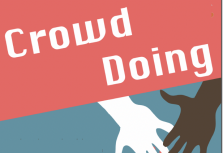
Opportunity Details
Passive Risk/Cost of Inaction Analyst Volunteer, Wildfire Prevention DerivativesPrevention Derivatives draws upon passive risk/ cost of inaction. Literature reviews on cost of inaction in general and with regards to wildfire specifically can be helpful.
-Prevention derivatives is driven by the thesis that there is an under-valuation of passive risk (or the cost of inaction) and an under-prioritization of positive risk. Correspondingly for wildfires as an example, there is an under-recognition of the potential shared value upside of preventative action through social innovation and social interventions (such as goats & sheep that prevent wildfires). CrowdDoing.world's aim is to guarantee positive risk through leveraging existing liabilities to allow for the implications of prescriptive analytics to be financed. The under-pricing of passive risk means that liabilities are treated as either costs of doing business or un-predictable risks even for entirely preventable risks. Risk management offices have been too biased towards avoiding taking the wrong risks rather than ensuring that institutions make their own luck by seizing the abundant positive risk opportunities in social innovation. Meanwhile, the bias against positive risk leaves social innovations not to get adopted even if there would be remarkable benefits to all stakeholders if they were adopted
In the framework of Prevention Derivatives, we want to create a predictive machine learning (ML) model that for a given geographical region will estimate likely savings (losses) due-to protection (damages) of stakeholders’ properties, business profits, common health, and regional ecology resulting in applying risk prevention solutions (or doing nothing instead). Goal of these notes is to analyze ML model’s design, offer a potential improvement and to discuss existing approaches for data collection, and training and testing the model. It is important to notice that the model is applied to the entire selected or target region. Therefore, a geographical region R is the smallest unit we apply modeling to.
Data science will be utilized in the following ways:
Explore/Visualize data currently available on Wildfires
Identify trends and patterns in Historical data
Quantify historical losses in dollars based on property destruction, casualties, acres burnt, etc.
Build predictive models to identify areas of high wildfire risk based on factors such as weather, vegetation, topography, etc.
Visualization of Model outcomes
Scenario building (changing input variables and observing impact on outcome)
Tools - R, Python, MATLAB, SQL, PowerPoint
Knowledge or Interest in anyone or more:
Identify papers on Simulation of Wildfires, Catastrophe Modeling
Review and present Technical papers in a way that everyone can understand
Assist in Model development and testing by contributing in finding data and programming
Identify/Collect data relevant to wildfire Impact
Work cross-functionally
Traits:
Mathematically inclined, highly analytical, creative problem solver, can conduct analyses independently or with minimal supervision
Programming for Data Science
Mathematics
Statistics
Predictive Analytics
Prescriptive Analytics
Machine Learning - Supervised/Unsupervised learning
Artificial Intelligence
Data Mining
Computer Science
Monte Carlo Simulations
Expectations:
If you have any questions about processes for joining CrowdDoing.world as a volunteer to support our efforts in systemic change please write to volunteerorientation@crowddoing.world
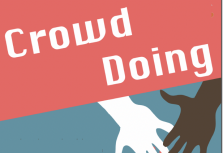
Opportunity Details
About Us: -CrowdDoing.world is a joint initiative of Match4Action Foundation and Reframe It. CrowdDoing is focused on addressing the social, economic, and environmental challenges our world faces by collaborating with professionals and volunteers from many different industries. We offer a platform for individuals to connect and collaborate toward creating systemic change. What makes us different? CrowdDoing aims to support social innovations with transformative impact potential through global multi-disciplinary volunteering, micro-leadership and service learning. We work through operating leverage for systems change to achieve collective agency. We orient to ikigai and self-determination theory in order to help each person have the perfect role. We would love for you to join the team!
Project Outline: -
Wildfire Prevention Derivatives is a framework/approach to align stakeholder (e.g., homeowners, landowners, utilities, local authorities, insurance and reinsurance companies, and others) interests and incentives in a way that leads to investment in Nature-based preventive solutions such as targeted grazing (by goats, sheep, etc.) as well as advanced technological solutions (e.g., IoT) in areas predicted by data driven models as highly vulnerable to wildfires. Prevention Derivative aims to mitigate preventable risks arising from wildfires instead of transferring them.
See more detailed background on CrowdDoing'sWildfire prevention derivatives
httpspublic://volop_imgs/volop_400070_feature.pngdrive.google.com/file/d/1dBp_HUr-tCCNaeGoSDfPrirRPbaoV3X4/view?usp=sharing
Role Description: -
We are looking for a qualified Silviculturists who will apply different treatments to make forests more productive and more useful to a landowner and society on a sustainable basis. Designs and implements silvicultural methods to develop stand composition and structures that may be reflected in natural disturbed ecosystems and thereby fulfill objectives that produce tangible (harvestable commodities) and intangible (ecosystem structure and function) benefit. The ideal Candidate is a good team player with great communication skills.
Key Responsibilities: -
Monitor contract compliance and results of forestry activities to assure adherence to government regulations.
Plan, supervise and conduct research in such problems of forest propagation and culture as tree growth rate, effects of thinning on forest yield, duration of seed viability, and effects of fire and animal grazing on growth, seed production, and germination of different species.
Establish short- and long-term plans for management of forest lands and forest resources.
Determine methods of cutting and removing timber with minimum waste and environmental damage.
Supervise activities of other forestry workers.
Skills and Competencies: -
Monitoring - Monitoring/Assessing performance of yourself, other individuals, or organizations to make improvements or take corrective action.
Critical Thinking - Using logic and reasoning to identify the strengths and weaknesses of alternative solutions, conclusions or approaches to problems.
Judgment and Decision Making- Considering the relative costs and benefits of potential actions to choose the most appropriate one.
Analytical or scientific software - Forest vegetation simulators; Forest yield software
Data base user interface and query software - Data entry software; Microsoft Access; SMART
Electronic mail software- IBM Notes; Microsoft Outlook
Inventory management software - Forest Metrix; Fountains Forestry TwoDog
Map creation software - ESRI ArcGIS software; ESRI ArcView; Geographic information system GIS software; Mapping software
Qualification and Experience: -
A Bachelor’s or Master’s degree in Forestry.
Combination of education and experience -- courses equivalent to a major in forestry, or at least 30 semester hours in any combination of biological, physical, or mathematical sciences or engineering, of which at least 24 semester hours were in forestry.
Experience and knowledge in silviculture, forest management operations, timber management, wildland fire science or fire management, utilization of forest resources, forest regulation, recreational land management, watershed management, and wildlife or range habitat management.
If you have any questions about processes for joining CrowdDoing.world as a volunteer to support our efforts in systemic change please write to volunteerorientation@crowddoing.world
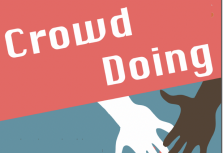
Opportunity Details
About Us: -CrowdDoing.world is a joint initiative of Match4Action Foundation and Reframe It. CrowdDoing is focused on addressing the social, economic, and environmental challenges our world faces by collaborating with professionals and volunteers from many different industries. We offer a platform for individuals to connect and collaborate toward creating systemic change. What makes us different? CrowdDoing aims to support social innovations with transformative impact potential through global multi-disciplinary volunteering, micro-leadership and service learning. We work through operating leverage for systems change to achieve collective agency. We orient to ikigai and self-determination theory in order to help each person have the perfect role. We would love for you to join the team!
Project Outline: -
Wildfire Prevention Derivatives is a framework/approach to align stakeholder (e.g., homeowners, landowners, utilities, local authorities, insurance and reinsurance companies, and others) interests and incentives in a way that leads to investment in Nature-based preventive solutions such as targeted grazing (by goats, sheep, etc.) as well as advanced technological solutions (e.g., IoT) in areas predicted by data driven models as highly vulnerable to wildfires.Prevention Derivative aims to mitigate preventable risks arising from wildfires instead of transferring them.
See more detailed background on CrowdDoing's Wildfire prevention derivatives
httpspublic://volop_imgs/volop_398310_feature.pngdrive.google.com/file/d/1dBp_HUr-tCCNaeGoSDfPrirRPbaoV3X4/view?usp=sharing
Role Description: -
We are looking for a qualified Fire Ecologists who will study the origins of fire, what influences spread and intensity, fire’s relationship with ecosystems, and how controlled fires can be used to maintain ecosystem health. They look to scientific research for guidance on how prescribed burns and lightningstarted fires can be used to benefit ecological systems.
Key Responsibilities: -
Assess and apply precedents to devise strategies and plans to overcome significant forest management problems. Adapt standard scientific techniques, processes, and procedures for unit use.
Provide technical assistance to all disciplines on methods for reestablishing fire’s role in the ecological system and fire ecology operations. Collect and analyze field data, project, and landscape level planning input to carry out studies.
Participate as a member of interdisciplinary teams to evaluate impact of service and other agency activities on national forest and other lands and resources.
Review and prepare long-and/or short-range plans for prevention, detection, pre-suppression, suppression, fire coordination and implementation, and fuels management efforts.
Review and evaluate the interrelationship of fire management program elements with functional resource plans and land management plans and schedules.
Assess need and provide input into fire management analysis systems and other fire management action plans.
Develop alternative strategies which reduce adverse effects on fire management and other activities.
Advise other principal staff on the compatibility of proposed functional area actions with the overall fire management plan.
Interpret available data to address variables, effect on other resources, and the rationale of the competing interests. Use database technology to manage natural resources.
Develop natural resources databases for use in making recommendations to management. Review existing data and collections for accuracy and appropriateness. Add additional data to complete or maintain a current inventory of natural resources.
Performs other duties as assigned. Performs wildfire suppression support as directed within training and physical capabilities.
Skills and Competencies: -
Ability to lead teams to effectively plan, ignite and extinguish controlled fires
Knowledge of vegetation that burns easily
Landscape and xeriscape in order to minimize fire damage and spread
Use computer programs to simulate a controlled fire
Use projected data to analyze and determine a particular outcome; craft a management plan and make adjustments as necessary
Provide remediation plans for land areas in the event of a wildfire to prevent future wildfires from occurring
Predict fire volatility of ecosystems based upon the vegetation and types of fuel present
Determine wildfire risk assessments of areas of land for government or private land owners
Qualification and Experience: -
An undergraduate degree in forestry, ecology or related field of study with extensive experience in fire and fuel management
A High degree of knowledge of ecological succession and vegetation in certain biomes or regions
If you have any questions about processes for joining CrowdDoing.world as a volunteer to support our efforts in systemic change please write to volunteerorientation@crowddoing.world
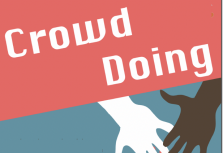
Opportunity Details
Wildfire Prevention Financing Data Analyst- CrowdDoing Volunteer-Prevention derivatives is driven by the thesis that there is an under-valuation of passive risk (or the cost of inaction) and an under-prioritization of positive risk. Correspondingly for wildfires as an example, there is an under-recognition of the potential shared value upside of preventative action through social innovation and social interventions (such as goats & sheep that prevent wildfires). CrowdDoing.world's aim is to guarantee positive risk through leveraging existing liabilities to allow for the implications of prescriptive analytics to be financed. The under-pricing of passive risk means that liabilities are treated as either costs of doing business or un-predictable risks even for entirely preventable risks. Risk management offices have been too biased towards avoiding taking the wrong risks rather than ensuring that institutions make their own luck by seizing the abundant positive risk opportunities in social innovation. Meanwhile, the bias against positive risk leaves social innovations not to get adopted even if there would be remarkable benefits to all stakeholders if they were adopted
Volunteer Actuary responsibilities include:
Conducting risk assessments
Building predictive models to accurately analyze potential outcomes
We are looking for an Actuary to conduct complex risk analyses and predict the outcome of potential investments.
What does an Actuary do?
As an Actuary, you’ll create statistical models to calculate likelihoods and you’ll present findings in detailed reports. To be successful in this role, you should have a flair for math and an analytical way of thinking.
Responsibilities
Conduct risk assessments
Build predictive models to accurately analyze potential outcomes
Calculate total assets and liabilities
Determine financial status after an investment
Compare actual ROIs with forecasts
Requirements
Work experience as an Actuary, Investment Analyst or similar position
In-depth understanding of how to use actuarial formulas and tables
Hands-on experience with statistical packages like SPSS
Good knowledge of insurance legislation
Excellent numerical and analytical skills
Attention to detail
BSc in Statistics, Mathematics or Finance
Additional certification in Risk Management or being successful in actuary exams is a plus
If you have any questions about processes for joining CrowdDoing.world as a volunteer to support our efforts in systemic change please write to volunteerorientation@crowddoing.world
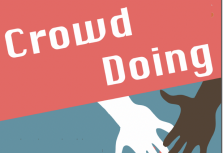
Opportunity Details
Wildfire Risk Prevention Financial Product Design Development & Architecture AnalysisYou can see a 35 minute video on prevention derivatives here:
httpspublic://volop_imgs/volop_398306_feature.pngwww.youtube.com/watch?v=btdpHKlZj2c&feature=youtu.be
Knowledge or Interest in developing around scientific and financial constraints, including:
Detection and Attribution of Wildfire Pollution
PM2.5 Wildfire Pollution Exposure
Wildfire Pollution Grossly Underestimated
Wildfire Pollution Puts specific populations at risk (for example, see Kidney Patients at Risk)
Wildfire Pollution can make People more Susceptible
Fire in an Area of Combustible Vegetation
Power-lines and wildfire risk
Houses are Destroyed by Wildfires
Spatial Patterns analysis
Climate Change as a factor in wildfire risk acceleration -climate change as a Common Causes of Wildfire
Lightning
Wildland-urban Interface Raises Wildfire Risk
Economics
Insurance
Cost - Benefit Analysis
Technical research
Environmental research
Market research
Business research
Insight generation
Expectations:
Identify/Collect data/papers/literature relevant to wildfire Impact
Quantify costs incurred by different stakeholders as a result of Wildfire
Generate Insights from currently available research papers
Present your work
Work cross-functionally
Traits:
Wildfire Prevention Financial Product Design Development & Architecture Analysis-
High curiosity, creative, critical thinking, can conduct analyses independently or with minimal supervision.
Develop core analytical capabilities or model libraries, using advanced statistical, quantitative, or econometric techniques.
Provide application or analytical support to wildfire prevention and insurance researchers or traders on issues such as valuations or data.
Research or develop analytical tools to address issues such as wildfire prevention portfolio construction or optimization, performance measurement, attribution, profit and loss measurement, or pricing models.
Maintain or modify all financial analytic models in use.
Apply mathematical or statistical techniques to address practical issues in finance, such as derivative valuation, risk management, or financial market regulation.
Devise or apply independent models or tools to help verify results of analytical systems.
Define or recommend model specifications or data collection methods.
Confer with other financial engineers or analysts on financial product structure in light of market dynamics, informed by the development of quantitative techniques.
Collaborate with product development teams to research, model, validate, or implement quantitative structured solutions for new or expanded wildfire prevention markets.
Consult team members to determine the need for new or improved analytical applications.
Collect, synthesize, analyze, manage, and report environmental data, such as pollution emission measurements, atmospheric monitoring measurements, meteorological or mineralogical information, or soil or water samples.
Communicate scientific or technical information to the public, organizations, or internal audiences through oral briefings, written documents, workshops, conferences, training sessions, or public hearings.
Provide advice on proper standards and regulations or the development of policies, strategies, or codes of practice for environmental management.
Prepare charts or graphs from data samples, providing summary information on the environmental relevance of the data.
Analyze data to determine validity, quality, and scientific significance and to interpret correlations between human activities and environmental effects.
Determine data collection methods to be employed in research projects or surveys.
Process and review environmental permits, licenses, or related materials.
Plan or develop research models, using knowledge of mathematical and statistical concepts.
Conduct applied research on environmental topics in wildfire prevention
Research sources of wildfire air pollution to determine their effects on the environment and to develop theories or methods of wildfire pollution prevention
If you have any questions about processes for joining CrowdDoing.world as a volunteer to support our efforts in systemic change please write to volunteerorientation@crowddoing.world
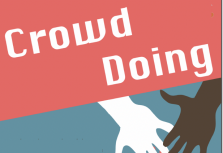
Opportunity Details
Project Overview:Project Name: CrowdDoing Projects
Project Duration: (in months) Ongoing
Project outline:
CrowdDoing Human Resources Sourcing Specialist Virtual Volunteer (global)
CrowdDoing supports a social innovation venture lab and a portfolio of social enterprises. Both the lab and the social enterprises aim to achieve systemic change through collaboration with virtual volunteers. A key kind of volunteer is the human resources sourcing specialist.
Social Enterprises and social innovations are mission-driven projects that have leverage for impact. We have a diverse set of these, including collaborations with social businesses, investment funds, philanthropic programs, purpose-based communities, and other initiatives that represent values-based and regenerative economic models for the 21st century.
Role Summary:
Reporting to the Meta volunteer of the People Management Team, Sourcing Operation Specialist is an integral part in the success of CrowdDoing. The Sourcing Operation Specialist will work to provide support to the People Management Team. Our Sourcing Operation Specialist possess the following competencies self-starter attitude, strategic, action oriented, quick learner, comfortable utilizing virtual communication methods, tech-savvy, multitasker, and strong communication skills.
Essential Tasks:
· Responsible for posting on various job posting websites.
· Sends initial contact emails to applicants advising them of the next steps.
· Ensure all applicants are entered into applicant tracking system under appropriate vacancy.
· Reviews all roles to ensure applicant has not applied to multiple roles before forwarding it to the respective HRBP, to eliminate duplicate interviews.
· Forward all volunteer applications to the appropriate area for interview.
· Responsible for maintaining volunteer Match and other website postings for accurate and clear role analyses.
· Regularly update a job description bank of all roles being posted online via HRBPs
· Maintain a consolidated up to date tracker of all potential applicants in Volunteer Match.
· Assist with exit management process.
Skills & Competencies:
· Minimum of 4 hours volunteer engagement per week
· Human Resources degree or experience preferred
· Highly collaborative style; experience working in a virtual environment highly preferred
· Excellent communication skills; follow up and follow through approach. Must be very responsive to all applicants within 48 business hours.
· A strong track record as being strategic.
· High energy, maturity, and leadership with the ability to serve as a unifying force for all communication efforts
· Self-starter, able to work virtually, independently, and entrepreneurial; enjoys creating and implementing new initiatives.
· Comfortable working in a startup phase non-profit organization.
One portrayal of the ""Four job skills the HR leaders of the future"" was written up in Fast Company by Lars Schmidt founder of Amplify & HR Open Source initiative. In the article were identified the following four characteristics of the HR leader of the future: Learning agility, creativity, business & data acumen, storytelling.
httpspublic://volop_imgs/volop_398305_feature.pngwww.fastcompany.com/90206307/four-job-skills-the-hr-leaders-of-the-future-will-need Each of these skills can effectively be learned through service learning CrowdDoing human resource volunteering.
In another portrayal of the future of human resources, Adhiraj Dey Adhiraj Dey - (VP (HR), ITC ), wrote article about the skills needed for being a human resources leader in the future:
· ""problem-solving ability
· Systems thinking
· Technology understanding
· Comfort with ambiguity""
· httpspublic://volop_imgs/volop_398305_feature.pngwww.thecareermuse.co.in/future-hr-2020-onwards/
· CrowdDoing Human Resources Business Partners can deploy their problem-solving ability, develop and apply systems thinking skills, gain greater technical understanding and navigate ambiguity with comfort as skills that are learnable through their roles with CrowdDoing. CrowdDoing works on systemic change for which systems thinking is required.
According to Barry Lawrence, HRCI Staff Writer, who wrote in his Human Resources Certification Institute’s Blog an article called, The Future of HR Competencies on Jun 14, 2016, there are six competencies that individuals will need to develop to be prepared for the future in HR. Five of the six can be developed through volunteering with CrowdDoing’s Human Resources Team:
Become strategic advisors who can articulate what’s necessary to properly execute a given strategy. Have the qualities of both cultural stewards and credible activists to achieve business outcomes. Embrace data analyst capabilities to help companies know where to invest and divest in terms of human capital.
Be talent development facilitators and weave talent development responsibilities throughout the organization. Cultivate a more innovative culture with divergent thinking and the testing of new ideas.""
· httpspublic://volop_imgs/volop_398305_feature.pngwww.hrci.org/community/blogs-and-announcements/hr-leads-business-blog/hr-leads-business/2016/06/14/the-future-of-hr-competencies
Talent Acquisition Specialist responsibilities include:
Coordinating with hiring managers to identify staffing needs.
Determining selection criteria.
Sourcing potential candidates through online channels (e.g. social platforms and professional networks.)
CrowdDoing Human Resources Sourcing Specialist Virtual Volunteer (global) brief
We are looking for a Talent Acquisition Specialist to join our Human Resources department and oversee our full-cycle recruiting.
Talent Acquisition responsibilities include sourcing candidates through various channels, planning interview and selection procedures and hosting or participating in career events. To be successful in this role, you should be able to develop long-term recruiting strategies and nurture trusting relationships with potential hires.
Ultimately, you will create strong talent pipelines for our company’s current and future hiring needs.
CrowdDoing Human Resources Sourcing Specialist Virtual Volunteer (global) Responsibilities
Coordinate with hiring managers to identify staffing needs
Determine selection criteria
Source potential candidates through online channels (e.g. social platforms and professional networks)
Plan interview and selection procedures, including screening calls, assessments and in-person interviews
Assess candidate information, including resumes and contact details, using our Applicant Tracking System
Design job descriptions and interview questions that reflect each position’s requirements
Lead employer branding initiatives
Organize and attend volunteer fairs and recruitment events
Forecast quarterly and annual hiring needs by department
Foster long-term relationships with past applicants and potential candidates
CrowdDoing Human Resources Sourcing Specialist Virtual Volunteer (global) Requirements
Proven work experience as a Talent Acquisition Specialist or similar role
Familiarity with social media, resume databases and professional networks (e.g. Stack Overflow and Github)
Hands-on experience with full-cycle recruiting using various interview techniques and evaluation methods
Knowledge of Applicant Tracking Systems (ATSs)
Excellent verbal and written communication skills
A keen understanding of the differences between various roles within organizations
BSc in Human Resources Management or relevant field
CrowdDoing Human Resources Sourcing Specialist Virtual Volunteer (global)
CrowdDoing is developing a new approach to reduce wildfire risk and prevent damage, while simultaneously regenerating nature and improving quality of life. This approach combines new analytic methods, data, financial tools, and collaboration.
The approach will be explored in-depth during a month-long hackathon which will culminate in a series of virtual events including a panel of senior risk executives, mentor-led break-outs, and awards to contributors.
Uncover how liabilities of inaction can be used to finance cover cost of prevention and adaptation for wildfires and beyond
Session goals include:
1. Demonstrate the acute need for proactive wildfire risk prevention in contrast to a traditional reactive approach
2. Advance a risk prevention strategy through improving the understanding of the concept of shared value wildfire prevention. This approach can leverage self-interest to scale a risk prevention strategy.
3. Connect the preventability of wildfire risks with subject matter experts with deep knowledge of the stakeholders who could share the risks and benefits of preventive, regenerative risk reduction strategies
4. Facilitate collaboration to make financeable wildfire prevention which can be effectively deployed to serve the financial needs of all stakeholders.
5. Provide service learning for all participants
6. Build Bridges between the cost-benefits analysis sector, the social innovation sector, and the insurance/reinsurance sector
7. Establish how the cost of inaction can be guaranteed against and used as a means to finance the opportunity for action to prevent risks, starting with wildfires
This is a ""reverse"" hackathon; rather than competing against one another, teams will focus on optimal collaboration to achieve SDG’s (Sustainable Development Goals). Our goal will be to allow stakeholders who benefit from wildfire prevention to understand the potential benefits and contract for risk prevention via collaboration.
Peter Diamandis noted the following on November 12th 2020 among the trends of the next decade: ""The insurance industry transforms from 'recovery after risk’ to 'prevention of risk .’"" Our ""prevention derivatives"" thesis is that anchor stakeholders at risk could demonstrably identify their self-interest in
preventing the air pollution and other damage caused by wildfires. CrowdDoing.world is working to accelerate that transformation via ""prevention derivatives"". Stakeholders share liabilities. Catastrophes cause harm to insurers, reinsurers, Insurance-linked-security holders, corporations, individuals, and whole regions. If we can prevent these risks cost effectively through social innovation, that is a collective opportunity. We plan to propose workshops, panel discussions and keynote presentations on our theme of ""How do we address the global cooperation gap in risk prevention?"" For example, preventing wildfires can be reduce risk for multiple types of stakeholders if combinations of social innovations getting financed and adopted. The idea of Prevention Derivatives is driven by the thesis that there is an under-valuation of passive risk (or the cost of inaction) and an under-prioritization of positive risk. Correspondingly for wildfires as an example, there is an under-recognition of the potential shared value upside of preventative action through social innovation and social interventions (such as goats & sheep that prevent wildfires). The aim of CrowdDoing.world is to guarantee positive risk through leveraging existing liabilities to allow for the implications of prescriptive analytics to be financed. The under-pricing of passive risk means that liabilities are treated as either costs of doing business or unpredictable risks even in the case of entirely preventable risks. Risk management offices have been too biased towards avoiding taking the wrong risks rather than ensuring that institutions make their own luck by seizing the abundant positive risk opportunities that social innovation can produce. Meanwhile, the bias against valuing positive risk prevents social innovations from getting adopted even if there would be remarkable benefits to all stakeholders through their adoption.
The only way CrowdDoing.world can realize its impact potential is through virtual volunteers,service learners(httppublic://volop_imgs/volop_398305_feature.pngblog.reframeit.com/service-learning-and-skilled-volunteering/), and micro-leaders (httpspublic://volop_imgs/volop_398305_feature.pngreal-leaders.com/leveraging-micro-leadership-to-make-aspirational-goals-achievable/) coming together.
See this brief video aboutMicro-leadership at CrowdDoing (httpspublic://volop_imgs/volop_398305_feature.pngwww.youtube.com/watch?v=mhdB2YJ8Ocs&app=desktop). Micro-leadership means that each person adopts a dimension of responsibility for a collective problem in our society through collaborating on that area creatively individually and together through social innovation.
You are also welcome to see more background on CrowdDoing at our Youtube Channel (httpspublic://volop_imgs/volop_398305_feature.pngwww.youtube.com/channel/UCVoL7fai7oa95fBo44FC0gA?sub_confirmation=1).
Instagram (httpspublic://volop_imgs/volop_398305_feature.pngwww.instagram.com/crowddoing.world/),
Facebook (httpspublic://volop_imgs/volop_398305_feature.pngwww.facebook.com/CrowdDoing-515295062320613) ,
LinkedIn (httpspublic://volop_imgs/volop_398305_feature.pngwww.linkedin.com/company/18910309/).
You can see a CrowdDoing Volunteering FAQ here.
httpspublic://volop_imgs/volop_398305_feature.pngdocs.google.com/document/d/1zCkbEQX8PHh8k85BS0iIhsJJxADqdH3Kpn1PDbI1Uno/edit?usp=sharing
If you have any questions about processes for joining crowddoing as a volunteer please write to volunteerorientation@crowddoing.world" "Project Overview:
Project Name: CrowdDoing Projects
Project Duration: (in months) Ongoing
Project outline:
CrowdDoing Human Resources Sourcing Specialist Virtual Volunteer (global)
CrowdDoing supports a social innovation venture lab and a portfolio of social enterprises. Both the lab and the social enterprises aim to achieve systemic change through collaboration with virtual volunteers. A key kind of volunteer is the human resources sourcing specialist.
Social Enterprises and social innovations are mission-driven projects that have leverage for impact. We have a diverse set of these, including collaborations with social businesses, investment funds, philanthropic programs, purpose-based communities, and other initiatives that represent values-based and regenerative economic models for the 21st century.
Role Summary:
Reporting to the Meta volunteer of the People Management Team, Sourcing Operation Specialist is an integral part in the success of CrowdDoing. The Sourcing Operation Specialist will work to provide support to the People Management Team. Our Sourcing Operation Specialist possess the following competencies self-starter attitude, strategic, action oriented, quick learner, comfortable utilizing virtual communication methods, tech-savvy, multitasker, and strong communication skills.
Essential Tasks:
· Responsible for posting on various job posting websites.
· Sends initial contact emails to applicants advising them of the next steps.
· Ensure all applicants are entered into applicant tracking system under appropriate vacancy.
· Reviews all roles to ensure applicant has not applied to multiple roles before forwarding it to the respective HRBP, to eliminate duplicate interviews.
· Forward all volunteer applications to the appropriate area for interview.
· Responsible for maintaining volunteer Match and other website postings for accurate and clear role analyses.
· Regularly update a job description bank of all roles being posted online via HRBPs
· Maintain a consolidated up to date tracker of all potential applicants in Volunteer Match.
· Assist with exit management process.
Skills & Competencies:
· Minimum of 4 hours volunteer engagement per week
· Human Resources degree or experience preferred
· Highly collaborative style; experience working in a virtual environment highly preferred
· Excellent communication skills; follow up and follow through approach. Must be very responsive to all applicants within 48 business hours.
· A strong track record as being strategic.
· High energy, maturity, and leadership with the ability to serve as a unifying force for all communication efforts
· Self-starter, able to work virtually, independently, and entrepreneurial; enjoys creating and implementing new initiatives.
· Comfortable working in a startup phase non-profit organization.
One portrayal of the ""Four job skills the HR leaders of the future"" was written up in Fast Company by Lars Schmidt founder of Amplify & HR Open Source initiative. In the article were identified the following four characteristics of the HR leader of the future: Learning agility, creativity, business & data acumen, storytelling.
httpspublic://volop_imgs/volop_398305_feature.pngwww.fastcompany.com/90206307/four-job-skills-the-hr-leaders-of-the-future-will-need Each of these skills can effectively be learned through service learning CrowdDoing human resource volunteering.
In another portrayal of the future of human resources, Adhiraj Dey Adhiraj Dey - (VP (HR), ITC ), wrote article about the skills needed for being a human resources leader in the future:
· ""problem-solving ability
· Systems thinking
· Technology understanding
· Comfort with ambiguity""
· httpspublic://volop_imgs/volop_398305_feature.pngwww.thecareermuse.co.in/future-hr-2020-onwards/
· CrowdDoing Human Resources Business Partners can deploy their problem-solving ability, develop and apply systems thinking skills, gain greater technical understanding and navigate ambiguity with comfort as skills that are learnable through their roles with CrowdDoing. CrowdDoing works on systemic change for which systems thinking is required.
According to Barry Lawrence, HRCI Staff Writer, who wrote in his Human Resources Certification Institute’s Blog an article called, The Future of HR Competencies on Jun 14, 2016, there are six competencies that individuals will need to develop to be prepared for the future in HR. Five of the six can be developed through volunteering with CrowdDoing’s Human Resources Team:
Become strategic advisors who can articulate what’s necessary to properly execute a given strategy. Have the qualities of both cultural stewards and credible activists to achieve business outcomes. Embrace data analyst capabilities to help companies know where to invest and divest in terms of human capital.
Be talent development facilitators and weave talent development responsibilities throughout the organization. Cultivate a more innovative culture with divergent thinking and the testing of new ideas.""
· httpspublic://volop_imgs/volop_398305_feature.pngwww.hrci.org/community/blogs-and-announcements/hr-leads-business-blog/hr-leads-business/2016/06/14/the-future-of-hr-competencies
Talent Acquisition Specialist responsibilities include:
Coordinating with hiring managers to identify staffing needs.
Determining selection criteria.
Sourcing potential candidates through online channels (e.g. social platforms and professional networks.)
CrowdDoing Human Resources Sourcing Specialist Virtual Volunteer (global) brief
We are looking for a Talent Acquisition Specialist to join our Human Resources department and oversee our full-cycle recruiting.
Talent Acquisition responsibilities include sourcing candidates through various channels, planning interview and selection procedures and hosting or participating in career events. To be successful in this role, you should be able to develop long-term recruiting strategies and nurture trusting relationships with potential hires.
Ultimately, you will create strong talent pipelines for our company’s current and future hiring needs.
CrowdDoing Human Resources Sourcing Specialist Virtual Volunteer (global) Responsibilities
Coordinate with hiring managers to identify staffing needs
Determine selection criteria
Source potential candidates through online channels (e.g. social platforms and professional networks)
Plan interview and selection procedures, including screening calls, assessments and in-person interviews
Assess candidate information, including resumes and contact details, using our Applicant Tracking System
Design job descriptions and interview questions that reflect each position’s requirements
Lead employer branding initiatives
Organize and attend volunteer fairs and recruitment events
Forecast quarterly and annual hiring needs by department
Foster long-term relationships with past applicants and potential candidates
CrowdDoing Human Resources Sourcing Specialist Virtual Volunteer (global) Requirements
Proven work experience as a Talent Acquisition Specialist or similar role
Familiarity with social media, resume databases and professional networks (e.g. Stack Overflow and Github)
Hands-on experience with full-cycle recruiting using various interview techniques and evaluation methods
Knowledge of Applicant Tracking Systems (ATSs)
Excellent verbal and written communication skills
A keen understanding of the differences between various roles within organizations
BSc in Human Resources Management or relevant field
CrowdDoing Human Resources Sourcing Specialist Virtual Volunteer (global)
CrowdDoing is developing a new approach to reduce wildfire risk and prevent damage, while simultaneously regenerating nature and improving quality of life. This approach combines new analytic methods, data, financial tools, and collaboration.
The approach will be explored in-depth during a month-long hackathon which will culminate in a series of virtual events including a panel of senior risk executives, mentor-led break-outs, and awards to contributors.
Uncover how liabilities of inaction can be used to finance cover cost of prevention and adaptation for wildfires and beyond
Session goals include:
1. Demonstrate the acute need for proactive wildfire risk prevention in contrast to a traditional reactive approach
2. Advance a risk prevention strategy through improving the understanding of the concept of shared value wildfire prevention. This approach can leverage self-interest to scale a risk prevention strategy.
3. Connect the preventability of wildfire risks with subject matter experts with deep knowledge of the stakeholders who could share the risks and benefits of preventive, regenerative risk reduction strategies
4. Facilitate collaboration to make financeable wildfire prevention which can be effectively deployed to serve the financial needs of all stakeholders.
5. Provide service learning for all participants
6. Build Bridges between the cost-benefits analysis sector, the social innovation sector, and the insurance/reinsurance sector
7. Establish how the cost of inaction can be guaranteed against and used as a means to finance the opportunity for action to prevent risks, starting with wildfires
This is a ""reverse"" hackathon; rather than competing against one another, teams will focus on optimal collaboration to achieve SDG’s (Sustainable Development Goals). Our goal will be to allow stakeholders who benefit from wildfire prevention to understand the potential benefits and contract for risk prevention via collaboration.
Peter Diamandis noted the following on November 12th 2020 among the trends of the next decade: ""The insurance industry transforms from 'recovery after risk’ to 'prevention of risk .’"" Our ""prevention derivatives"" thesis is that anchor stakeholders at risk could demonstrably identify their self-interest in
preventing the air pollution and other damage caused by wildfires. CrowdDoing.world is working to accelerate that transformation via ""prevention derivatives"". Stakeholders share liabilities. Catastrophes cause harm to insurers, reinsurers, Insurance-linked-security holders, corporations, individuals, and whole regions. If we can prevent these risks cost effectively through social innovation, that is a collective opportunity. We plan to propose workshops, panel discussions and keynote presentations on our theme of ""How do we address the global cooperation gap in risk prevention?"" For example, preventing wildfires can be reduce risk for multiple types of stakeholders if combinations of social innovations getting financed and adopted. The idea of Prevention Derivatives is driven by the thesis that there is an under-valuation of passive risk (or the cost of inaction) and an under-prioritization of positive risk. Correspondingly for wildfires as an example, there is an under-recognition of the potential shared value upside of preventative action through social innovation and social interventions (such as goats & sheep that prevent wildfires). The aim of CrowdDoing.world is to guarantee positive risk through leveraging existing liabilities to allow for the implications of prescriptive analytics to be financed. The under-pricing of passive risk means that liabilities are treated as either costs of doing business or unpredictable risks even in the case of entirely preventable risks. Risk management offices have been too biased towards avoiding taking the wrong risks rather than ensuring that institutions make their own luck by seizing the abundant positive risk opportunities that social innovation can produce. Meanwhile, the bias against valuing positive risk prevents social innovations from getting adopted even if there would be remarkable benefits to all stakeholders through their adoption.
The only way CrowdDoing.world can realize its impact potential is through virtual volunteers,service learners(httppublic://volop_imgs/volop_398305_feature.pngblog.reframeit.com/service-learning-and-skilled-volunteering/), and micro-leaders (httpspublic://volop_imgs/volop_398305_feature.pngreal-leaders.com/leveraging-micro-leadership-to-make-aspirational-goals-achievable/) coming together.
See this brief video aboutMicro-leadership at CrowdDoing (httpspublic://volop_imgs/volop_398305_feature.pngwww.youtube.com/watch?v=mhdB2YJ8Ocs&app=desktop). Micro-leadership means that each person adopts a dimension of responsibility for a collective problem in our society through collaborating on that area creatively individually and together through social innovation.
You are also welcome to see more background on CrowdDoing at our Youtube Channel (httpspublic://volop_imgs/volop_398305_feature.pngwww.youtube.com/channel/UCVoL7fai7oa95fBo44FC0gA?sub_confirmation=1).
Instagram (httpspublic://volop_imgs/volop_398305_feature.pngwww.instagram.com/crowddoing.world/),
Facebook (httpspublic://volop_imgs/volop_398305_feature.pngwww.facebook.com/CrowdDoing-515295062320613) ,
LinkedIn (httpspublic://volop_imgs/volop_398305_feature.pngwww.linkedin.com/company/18910309/).
You can see a CrowdDoing Volunteering FAQ here.
httpspublic://volop_imgs/volop_398305_feature.pngdocs.google.com/document/d/1zCkbEQX8PHh8k85BS0iIhsJJxADqdH3Kpn1PDbI1Uno/edit?usp=sharing
If you have any questions about processes for joining CrowdDoing.world as a volunteer to support our efforts in systemic change please write to volunteerorientation@crowddoing.world
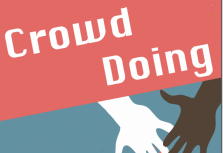
Opportunity Details
Wildfire Risk Prevention Financial Product Design Development & Architecture Analysis (with Video Introduction!)p.s.
To see an 18 minute video introduction and overview of prevention derivatives as a framework- please see here what we shared in 2020 at the Skoll World Forum and at Social Venture Circle- httpspublic://volop_imgs/volop_398302_feature.pngyoutu.be/GMYEjyPGDK0
Knowledge or Interest in developing around scientific and financial constraints, including:
Detection and Attribution of Wildfire Pollution
PM2.5 Wildfire Pollution Exposure
Wildfire Pollution Grossly Underestimated
Wildfire Pollution Puts specific populations at risk (for example, see Kidney Patients at Risk)
Wildfire Pollution can make People more Susceptible
Fire in an Area of Combustible Vegetation
Power-lines and wildfire risk
Houses are Destroyed by Wildfires
Spatial Patterns analysis
Climate Change as a factor in wildfire risk acceleration -climate change as a Common Causes of Wildfire
Lightning
Wildland-urban Interface Raises Wildfire Risk
Economics
Insurance
Cost - Benefit Analysis
Technical research
Environmental research
Market research
Business research
Insight generation
Expectations:
Identify/Collect data/papers/literature relevant to wildfire Impact
Quantify costs incurred by different stakeholders as a result of Wildfire
Generate Insights from currently available research papers
Present your work
Work cross-functionally
Traits:
Wildfire Prevention Financial Product Design Development & Architecture Analysis-
High curiosity, creative, critical thinking, can conduct analyses independently or with minimal supervision.
Develop core analytical capabilities or model libraries, using advanced statistical, quantitative, or econometric techniques.
Provide application or analytical support to wildfire prevention and insurance researchers or traders on issues such as valuations or data.
Research or develop analytical tools to address issues such as wildfire prevention portfolio construction or optimization, performance measurement, attribution, profit and loss measurement, or pricing models.
Maintain or modify all financial analytic models in use.
Apply mathematical or statistical techniques to address practical issues in finance, such as derivative valuation, risk management, or financial market regulation.
Devise or apply independent models or tools to help verify results of analytical systems.
Define or recommend model specifications or data collection methods.
Confer with other financial engineers or analysts on financial product structure in light of market dynamics, informed by the development of quantitative techniques.
Collaborate with product development teams to research, model, validate, or implement quantitative structured solutions for new or expanded wildfire prevention markets.
Consult team members to determine the need for new or improved analytical applications.
Collect, synthesize, analyze, manage, and report environmental data, such as pollution emission measurements, atmospheric monitoring measurements, meteorological or mineralogical information, or soil or water samples.
Communicate scientific or technical information to the public, organizations, or internal audiences through oral briefings, written documents, workshops, conferences, training sessions, or public hearings.
Provide advice on proper standards and regulations or the development of policies, strategies, or codes of practice for environmental management.
Prepare charts or graphs from data samples, providing summary information on the environmental relevance of the data.
Analyze data to determine validity, quality, and scientific significance and to interpret correlations between human activities and environmental effects.
Determine data collection methods to be employed in research projects or surveys.
Process and review environmental permits, licenses, or related materials.
Plan or develop research models, using knowledge of mathematical and statistical concepts.
Conduct applied research on environmental topics in wildfire prevention
Research sources of wildfire air pollution to determine their effects on the environment and to develop theories or methods of wildfire pollution prevention.
If you have any questions about processes for joining CrowdDoing.world as a volunteer to support our efforts in systemic change please write to volunteerorientation@crowddoing.world

Opportunity Details
Le rôle d’un animateur scout est de mettre la vie et de faire vivre des aventures et des défis palpitants aux jeunes, le tout, dans l’optique des valeurs de la loi scoute. C’est à travers les animateurs que le scoutisme s’adresse aux jeunes. Le rôle principal de l’animateur est d’encadrer les efforts des jeunes. L’animateur prend les jeunes au sérieux et met à profit son expérience en les aidant à choisir leur aventure, à l’organiser et à laréaliser jusqu’au bout.
